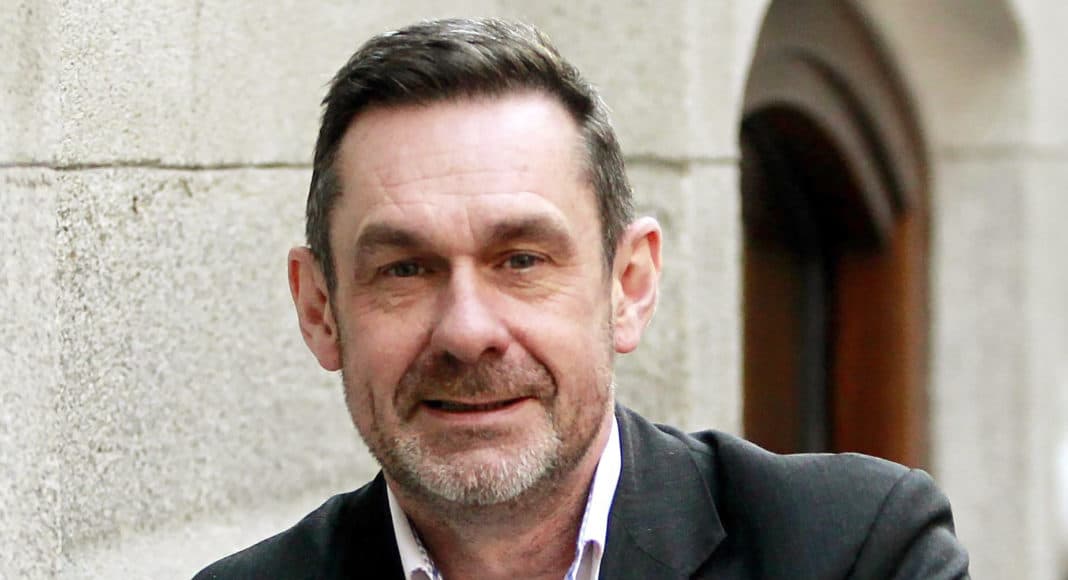How to stop new fascism speakes of nowadays but has deep roots in Paul Mason’s life. What was your first experience of fascism? I read that in your childhood you came across in disused wartime air-raid shelters scrawled with anti-Nazi graffiti. Is that right? What are your memories?
I first became aware that fascism existed by watching the first five seconds of a documentary about the liberation of Bergen-Belsen. The famous shot of bodies being bulldozed into mass graves came on. My mother – who was half-Jewish – switched it off, violently. She explained to me – I was maybe 5 years old – that the Nazis had killed a lot of Jewish people and that she would have been one of them. It was presented to me, then, as a piece of ancient history. But it was only as far away in time as 9/11 is to today. It made sense of the word I had seen graffiti-ed onto the walls of disused air-raid shelters, which were to me the ultimate scary playground as a kid: No Nazis. Nazis out. Fuck Nazis. That conversation, and those images, added an extra dimension to my life that has never really gone away: the knowledge that, if things go really badly in the world, despite my DNA being only 27% “Ashekenazi Jew” my life could end by being herded into a concrete box from which I do not emerge.
Since you where a boy, before becoming a famous essayist and journalist, you have been an anti-fascist activist, disrupting events organised by small groups such as the National Front and the British National Party. Can you tell us something about that experience and how it contributed to your education?
The 1970s were experienced as the fall of a working civilisation. At the start of the 1970s my father was occupying union offices, staging wildcat strikes; a minister had to appear on TV with only a candle for lighting because a mass strike switched off the power. The end of the 1970s began, for me, when a convoy of police riot vans – which nobody knew existed – passed me on the way to suppress an antifascist demo in a nearby small town. From then on, through university and right up to the mid-1990s, we were at sporadic war with a kind of “Fascism 1.5” – the National Front, Combat 18, The British National Party. Nazi tribute bands with a strong element of Nordic mysticism and “Third Position” street violence (in fact inspired by Fiore).There is no statute of limitations in the UK, so I will not go into detail. We mobilised big groups of young, working class men – with a subculture that still lives, 30 years later, in the European antifa scene. We took actions that made it hard for the fascist groups to hold meetings, concerts, or campaign in elections.What did we succeed in? They disappeared off the streets, changed their names, abandoned violence, wore suits and began to understand that the real battle is ideological. So today we are facing something much more powerful: a fascism that is not a “tribute band” to Nazism but has regrown – like the root ball of a plant – in different conditions.
In your new book you imagine the Nazis inventing a time machine at the end of World War II. In your fantasy, a crack SS team travels 75 years into the future to 2020. Do you think they wuold be gratetful to the work of many nowdays leaders such as Orban, Erdogan, Kashinski, Lukaschenko, Putin, Bolsonaro, Meloni, Salvini and may others who speak of racial purity, male supremacy and leader worship?This idea began as a screenplay. Its a cool idea – time travelling Nazis arrive in 2020 to destroy democracy. But the more I worked on it, the more I realised it would have to be a comedy – because the joke is, their mission is entirely unneccesary.Fascism has regrown from its pre-1915 philosophical roots – Nietzsche, Bergson, Sorel, Maurras, Le Bon, Spengler, Social-Darwinism – it’s all back, and perfectly adapted to the world of Bitcoin, NFTs and troll farms.
And what about parties like Vox in Spain winning three million votes as they rail against migrants and feminists. And what about Golden Dawn in Greek?
Golden Dawn was defeated because it stuck to three things modern fascists don’t need: command hierarchy, Nazi regalia and targeted murder. Their members murdered Pavlos Fyssas, the antifascist musician; the authorities – who had been tolerating them disgracefully – were forced to investigate; and with one small effort they uncovered a command structure of a criminal enterprise with SS uniforms in secret basements. I don’t think we’re going to be so lucky with Vox, or with Zemmour. The 21st century far right works through networks, not hierarchies; its violence is symbolic – designed to tell a story to millions, not silence one voice; and it doesn’t need Nazi memorabilia – it has its own, subtextual and ironic visual code.
Vox and Golden Dawn, (which thankfully is on trial), are extremist groups, but the Nazis of your time machine would also be happy with certain ultraliberal sides of Western society? We don’t forget that that 74 million people voted for Trump in November’s election in 2016, and we do not forget the assault on Capitol Hill. What do you think about that?
I don’t call Trump ultraliberal. What we’re seeing is the inversion of right-wing tech-bro libertarianism into the demand for the authoritarian state. At the fulcrum of this sudden inversion is race. The libertarian of the 1990s sees Black Lives Matter, or he sees migrants landing on Lampedusa, and he says: in order for my life to remain “free”, the lives of the minority must be subjected to absolute authoritariaism. And yes, tens of millions of people are racist. In America, in Europe, in India, in Latin America. The biggest ongoing genocides we have, right now, are in Asia. So political science spent 30 years constructing fine definitions: authoritarian conservatism, right wing populism, the alt-right, the far right. The problem is they have all converged around a shared project – to spread the Great Replacement myth, to attack feminism and human rights, to construct the authoritarian state and impose high costs, in terms of violence and institutional decay, on anyone who tries to remove them through voting. Trump is not actually their model. Putin and Erdogan are the models. And we have to understand – Trump is not “defeated”. America democracy is fragile – I don’t know if it will exist beyond the mid-2020s.
Talking about France, Marine Le Pen will attempt to oust Emmanuel Macron in next presidential election. And they are threatened by the xenophobe Zemmour. Do the anti-fascists have no voice? With what consequences?
The French presidential election has turned into a textbook confirmation of my thesis. The “liberal” Macron attacks Islam. Zemmour emerges, prepared to use the most disgusting overt racism. Le Pen, who had made herself acceptable by stifling the old racism of her father, and concentrating on economic grievance, suddenly finds that what racists want is ethno-supremacy, not just petrol. Meanwhile the centre left has disintegrated because – as in the UK – it cannot work out how to simultaneoulsy represent the young and the old, the cool and the uncool.
Coming to Italy. There is a chapter in your book “To destroy everything” in which you reconstruct how in 1922 Mussolini took power, after he had been underestimated, considered a wreck and left on the loose. Why wasn’t he stopped?
First, because Italian “liberalism” of the late Giolitti era was not liberal at all, and actually sponsored Mussolini. Second because the Italian state was weak: two kinds of policemen added up to no kind of policing and the rule of law disintegrated. Third because of the “Maximalist” dreams of the socialist workers and peasants themselves. They could imagine socialism but not barbarism. There was nothing in the Marxism of the Second International, which was a mass ideology in Italy, that prepared them for the phenomenon of “radical evil”. Finally, because the PCI’s leaders were absolutely stupid – above all Bordiga, who told the Comintern everythign would be OK after the March on Rome and that Mussolini’s regime would be “liberal”.What the whole episode makes me fear is the inertia of ordinary people trapped in organisational cultures. “If i break with Bordiga, or if I break with the Maximalist culture I grew up in, my friends will hate me; I won’t get on the local committee; my name won’t be on the list of candidates”. I see the same instincts among left-wing and social movement people today. If I don’t call for the abolition of the police, or “full surrogate motherhood now!” I will not get invited to the next cool party. We have to think our way out of this problem – and thinking demands dissonance, alternatives, respectful arguments, logic over emotion – and the left’s biggest problem right now is its intolerance for these things: dissonance, difference and logic.
Some month ago far-right groups such as Forza Nuova attacked the headquarters of the CGIL union in Rome. Also in 1919 and 1921 the fascists attacked union offices and the socialist newspaper L’Avanti!. We are not in the same predicament, of course. History does not repeat itself, but do you think that Italy has never reckoned enough with the Fascist period?
2022 is a great year in which I hope Italian students and school students can measure, day by day, the speed at which democracy went down the plughole. You should mark the centenary of every massacre by the Blackshirts, of the legal general strike, of the Parma uprising, and the March on Rome – almost hour by hour – because these are living lessons in how a fascist coup could be defeated. That’s why, in the book, I present the rise of Mussolini as a “board game” – with alternative outcomes but only so many moves.
In Italy for the President of the Republic’s election, which confirmed Mattarella, Giorgia Meloni and Matteo Salvini were praising for a presidential republic and they supported Marcello Pera (a crusader with Christian roots of Europe) and Berlusconi («vero patriota», Meloni said) who was enrolled in the P2, and who tried to tamper with the anti-fascist constitution, what do you think?
Everywhere this alliance of the conservative right, the populist right and the fascists has the same modus operandi: turn parliamentary democracies into presidential autocracies, bring in the oligarchs – from Russia, Saudi, China, it doesn;t matter – to fund a permanent hereditary elite, and then print money from the central bank to pay for both bread and circuses, both guns and butter.To stop it you need a mass movement devoted not to socialism but to antifascist popular democracy and social justice. I think we can build that – but only if we, the left, disrupt our tired ways of thinking.





